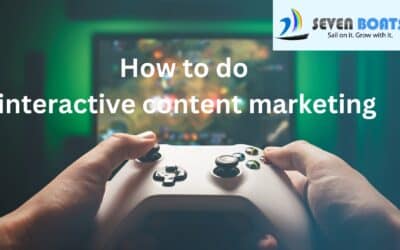
How to sell to people who don’t know you?
A week back there was this massive Black Friday sale. People were jostling online to grab the best and the latest products at throwaway prices. If you have participated in similar jostling sessions online or offline, you know that more often than not, when the prices hit rock bottom, you end up buying products that you don’t even need!
Before getting to see that massive discount on the shelves, you never thought that you needed a microSD card with deeper memory pockets or that the new headphones opened up musical notes that were unheard of before you put them on.
Is the price drop the only reason you cherish those purchases? The answer is a little more complicated than that. The need or desire to purchase these products was latent or dormant in your mind.
When you saw those jaw-dropping discounts, that desire pushed itself to the forefront and you ended up buying. It is an age-old marketing mantra: most potential consumers do not even know that they require a certain product/service or they have any need of it.
As a marketer, you are selling to people who queue up to buy your products/services. It is also your prerogative as a marketer to fish out that dormant desire in potential customers and make them buy your products.
Steps in that Direction
Pushing your brand of products/services to this group of disinterested customers will not solve your problem. The reason is that no matter how good your product/service is or how much of a discount you offer, they will simply ignore your overtures.
You need to make them realize first that they have a requirement of this product and then push your brand across. The brand comes later. The primary task is to bring out the hidden requirement of that particular product. Keeping this consumer psychology in marketing in mind, there are 3 steps in this process:
Need Awareness
This is the stage when the potential consumer does not know that they need a particular product, not a particular brand of product. At this stage of marketing, you will have to focus on making them realize how important that product can be in their lives and how it can make it simpler for them. You need to use an emotional tug to ensure that consumers understand the need to possess such a product.
Solution Awareness
Now that the consumer knows that there is a problem or need in their mind, they need a solution. Your product is the solution. Again, the operative word is the product, not your brand of product. The product will solve the need felt in the first stage of this process.
You have to position your product in a way that the potential consumers understand this product as the best solution to their freshly-perceived problem.
Both the first and second stages of the process focus on the consumer and their needs. You or your brand comes in after the second stage is over.
Brand Awareness
Now that the product/service is in the mind of the consumer as the ultimate solution to their need or problem, you step in with your brand. You tell them that your brand of product/service is the perfect choice among the products/services that can resolve their need/problem. Your marketing job at this stage is to link the name of your brand with the need felt in the consumer’s mind.
If you can do it well, the first stage will merge with the third, cutting out the brand competition that can happen at the second stage. For example, look at Google. When you think you need to search something (1st stage), you think of Google (3rd stage). You do not even consider that your need can be resolved in any other way (2nd stage).
Key strategies on how to sell to people who don’t know you
Selling to people digitally who don’t know you can be challenging, but with the right approach, you can build trust and effectively market your products or services. Here are some strategies to consider:
- Create an Engaging Website: Develop a professional and user-friendly website that showcases your products or services. Provide clear and concise information, compelling visuals, and easy navigation to engage visitors and encourage them to explore further.
- Leverage Social Media: Utilize social media platforms to reach and engage with potential customers. Create engaging content, share valuable information, and interact with your audience through comments, direct messages, or live sessions. Building an active online presence can help establish credibility and attract new customers.
- Content Marketing: Develop high-quality content such as blog posts, videos, or podcasts that provide value to your target audience. Share informative and educational content that addresses their pain points and demonstrates your expertise. This can help establish you as a trusted authority in your industry.
- Search Engine Optimization (SEO): Optimize your website and content for search engines to improve visibility and attract organic traffic. Conduct keyword research to understand what your target audience is searching for, and incorporate relevant keywords into your website and content to increase your chances of being found online.
- Paid Advertising: Consider using paid advertising channels like Google Ads or social media advertising to reach a wider audience. Target your ads based on demographics, interests, or behaviors to reach potential customers who may not be aware of your brand.
- Influencer Marketing: Collaborate with influencers or industry experts who have a significant following in your target market. Their endorsement of your products or services can help build trust and introduce your brand to their audience.
- Offer Freebies or Trials: Provide free samples, trials, or limited-time promotions to entice potential customers to try your products or services. This can help overcome initial skepticism and encourage them to make a purchase.
- Email Marketing: Build an email list by offering valuable content or exclusive promotions in exchange for visitors’ email addresses. Use email marketing campaigns to nurture leads, provide personalized recommendations, and stay connected with potential customers.
- Customer Reviews and Testimonials: Display customer reviews and testimonials on your website or social media platforms. Positive feedback from satisfied customers can build trust and credibility, especially for those who are unfamiliar with your brand.
- Remarketing: Implement remarketing strategies to target people who have previously visited your website but did not make a purchase. Show relevant ads to remind them of your products or services and encourage them to reconsider.
Remember, building trust and establishing customer relationships take time. Consistently provide value, engage with your audience, and deliver exceptional customer experiences to gradually convert unknown prospects into loyal customers.
Final Word
You may ask now: should you do away with your brand’s name in the first two stages? By all means, no! You still have to buy advertising spots, won’t you? Keep feeding the potential consumers your brand logo, catch-lines, product/service images, etc.
Let those grow on their minds as they wake up to the need of those products/services. This will ensure better brand recall. The post here talks about the marketing message that you should deliver and what it should be in the 3 stages.
Also, each consumer is in a different stage of the process. Your advertising campaigns must not focus on one single stage only. Some consumers already know about their need, some know the solution while some are already eager for the best solution on the table. Customize your advertising message in the best possible way so that it reaches the right target audience.
Do you have anything to do here? Leave a comment!








Have been looking for internet marketing service providers in India. Wanted to shift my business online so i give a newer platform . Thanks for writing this blog it is quite insightful.